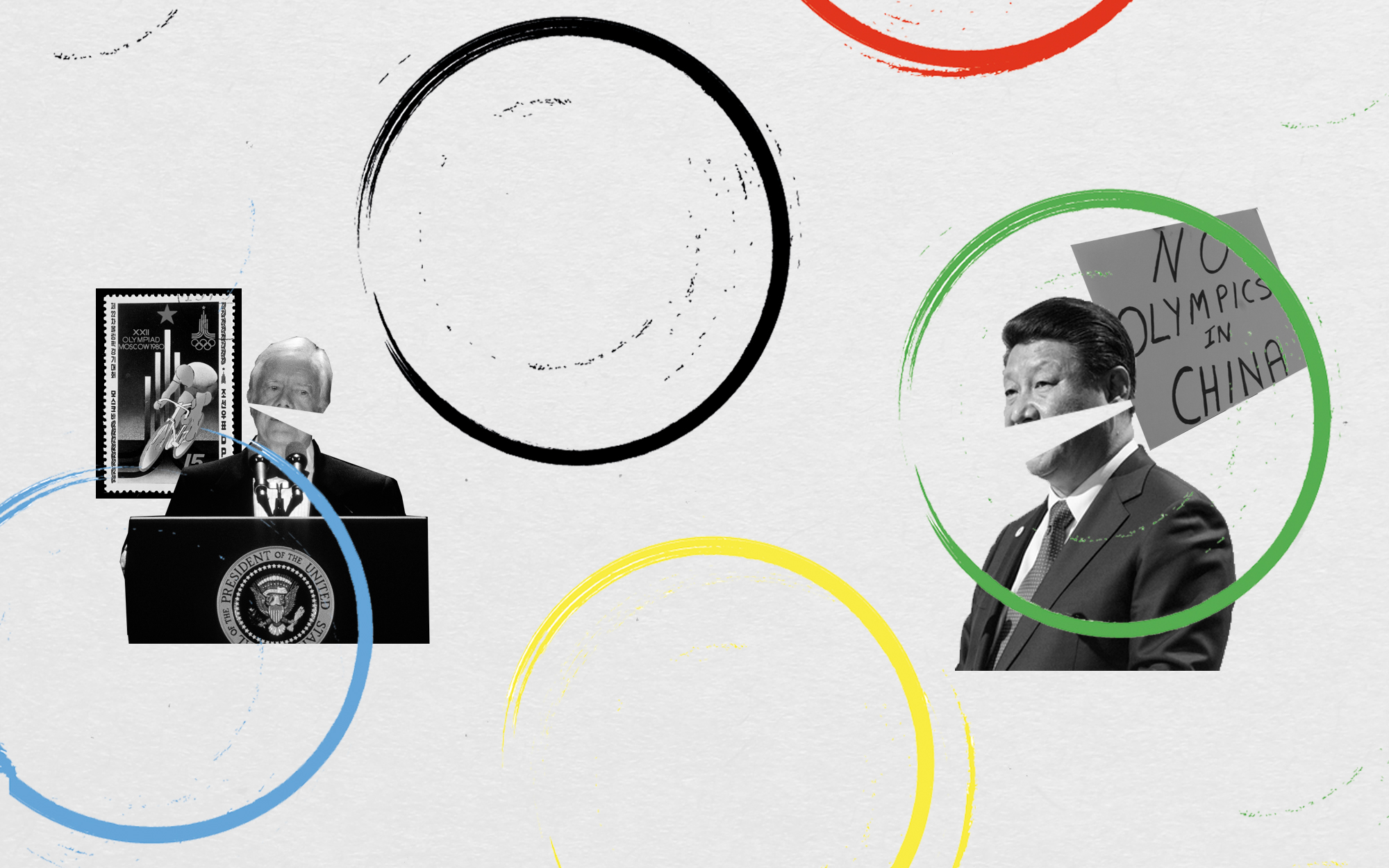The diplomatic boycott of the Beijing Olympics by the United States, Great Britain, and other countries might strike some observers as a troubling sign that international relations have become more turbulent. Should it concern us that the major powers in world politics cannot come together for a sporting event without a great deal of controversy? Is the international community in a hopeless downward spiral that will feature more and more conflict and tension in the coming years?
In reality, boycotts of international sports competitions have happened many times throughout history, going back to almost the very beginning of the modern Olympic movement. As the prominent sports historian David Goldblatt recently pointed out, the first Olympic boycott occurred in 1906 and was actually carried out by the founder of the modern Olympics, Pierre de Coubertin. Greece had hosted the first Olympics in 1896 and wanted to be the permanent home of the Olympic games. On the other hand, Coubertin believed that the games should be moved to a different city every four years, giving them a more global presence. When the Greeks staged their second Olympic Games in 1906 against the wishes of Coubertin, they received support from many members of the International Olympic Committee (IOC), but Coubertin refused to attend the event out of protest.
Another interesting case was the boycott of the 1964 Tokyo Olympics by Indonesia and China. The countries accused the Olympic movement of being inherently political and biased against rising nations. In an attempt to create an alternative to the Olympics, Indonesia staged a new international sports event in 1963 called The Games of the New Emerging Forces. This competition intentionally mimicked the Olympics in many ways, featuring a torch relay as well as opening and closing ceremonies. However, the event deliberately sought to take on a broader significance by including a rally, an art exhibition from the participating nations, and other cultural events. The competition was to some extent successful, with about 50 nations participating. However, most did not send their best athletes, because anyone who competed in the event was barred from the Olympics.
Apartheid South Africa caused controversy and division throughout sport. At the beginning of the 1960s, the government wanted to send an all-white sport team to the Olympics despite the fact that whites only made up about 20% of the country’s population. However, the IOC banned South Africa for blatantly violating the IOC charter’s prohibition against racial discrimination in sport. In 1968, South Africa changed course and promised to send a multiracial team to the Olympics in Mexico City. The IOC invited it to attend, despite the fact that racism continued to pervade South African sports, but in response, about 40 countries declared that they would boycott the 1960 Olympics if South Africa was allowed to compete. Consequently, the IOC banned South Africa, and the country would not return to the Olympics until Apartheid ended in the early 1990s.
Countries risk legitimizing an oppressive political system, or potentially provoking a backlash.
In a 2011 study on Olympic protests, political scientists M. Patrick Cottrell and Travis Nelson identified 15 Olympic boycott movements between 1920 and 2008, which featured approximately 70 countries refusing to attend the Olympic games. The most common motivations were disagreements over the host nation and anger over the participation of certain countries such as South Africa, China, and Taiwan. There was also a case where Ireland boycotted over a controversy related to athlete eligibility, and two others where Taiwan refused to send athletes because it could not call itself “Republic of China”.
Perhaps the most famous case involved very little actual boycotting, but a rather heated debate over doing so. In 1936, Hitler hosted the Berlin Olympics amidst a great deal of outrage over his discriminatory domestic policies, with many Jewish groups and Nazi critics pushing for a boycott of the games. In the United States, the movement was taken very seriously, but after much debate and an inspective trip to Berlin by the head of the U.S. Olympic Committee, Avery Brundage, the United States agreed to participate.
The result was a huge propaganda victory for Hitler. Due to their size and media coverage, the games were very popular among the German youth. Germany also dominated in the medal count (despite the success of Jesse Owens), feeding into Hitler’s delusional claims of racial superiority. They also allowed Germany to project a (false) positive image to the international community: a country with a modern and progressive government.
The only country to officially boycott was Spain, which was controlled by the Republicans at the time. The Spanish government actually tried to put on its own international sporting event in Barcelona–the People’s Olympiad. However, the event was scrapped because the Civil War broke the day before the competition was supposed to start.
In 1980, the United States tried the opposite approach by boycotting the Moscow Olympics following the Soviet invasion of Afghanistan in 1979. About 60 other countries joined in the boycott. President Carter and others believed that the Soviet action constituted an egregious violation of human rights and international law, insisting that the Olympics should be boycotted unless the Soviets withdrew their forces from Afghanistan.
The Soviets did not withdraw, continuing to occupy Afghanistan until 1989. In fact, the boycott has been remembered by many in the West as an action that accomplished little while spoiling the dreams of many athletes. The Soviets certainly viewed the boycott as an insult. They claimed that the real reason was not the war in Afghanistan, but the Carter administration’s desire to appease domestic groups and its unwillingness to allow the Soviets to host a successful Olympic games.
In the 1980 Moscow Games, the Soviets dominated, winning almost 40% of the gold medals. In fact, the absence of the United States as a viable competitor may have increased the Soviets’ ability to utilize the games for propaganda purposes.
These two cases illustrate the costs countries can pay both from boycotting and not boycotting the Olympics for political reasons. Either the country risks legitimizing an oppressive political system, or it could potentially provoke a backlash from that country while also depriving its athletes of a lifetime opportunity to compete on the largest stage. In short, the question of whether to boycott the Olympics in an authoritarian country can never be taken lightly.
In our research, we examine cases where international sports organizations banned countries in an effort to encourage them to change their behavior. Specifically, we focus on cases where countries were banned from the Olympics or international soccer tournaments.
Our results suggest that punishing countries in the sporting realm can compel them to change their behavior, but only in issues related to sports governance. For example, sports bans have ended undue government interference in national sports organizations, persuaded the South African government to at least partially desegregate its sports leagues, and helped diminish prohibitions on women’s participation in sports.
Just because the target government resisted change does not mean that the punishment was necessarily ineffective.
On the other hand, for issues that go beyond sports governance, such as ending military occupations or democratizing a country’s political system, sports sanctions do not seem to have much chance to change behavior. This logic was evident in the 1980 Moscow case, and a number of other examples like Rhodesia and South Africa suggest that sports sanctions lack the punch to achieve broad political goals that go beyond sports.
It is also important to recognize that sanctions and boycotts can have many goals beyond simply getting the target country to comply. They can potentially deny a government legitimacy and limit its ability to use the event for propaganda purposes. They might also potentially deter other countries from engaging in the same behavior in the future by demonstrating that there could be costs for such actions. For example, after Afghanistan was banned from the Olympics in 2000 for not allowing women to participate in sports, Saudi Arabia began making sports more accessible to its female population. Therefore, just because the target government resisted change does not mean that the punishment was necessarily ineffective.
Looking at the 2022 Beijing Olympics, the boycott focuses on issues that go well beyond sports governance. They relate to the treatment of a minority ethnic group. Our research suggests that even a full boycott in a case like this would be very unlikely to compel the target government to change its behavior. Therefore, measuring “success” in a case like this probably depends more on how one defines “success” than the actual impact of the boycott on the target government’s behavior. Just as the legacy of an Olympic games is measured years down the line, the legacy of boycotts can be too.
© IE Insights.











